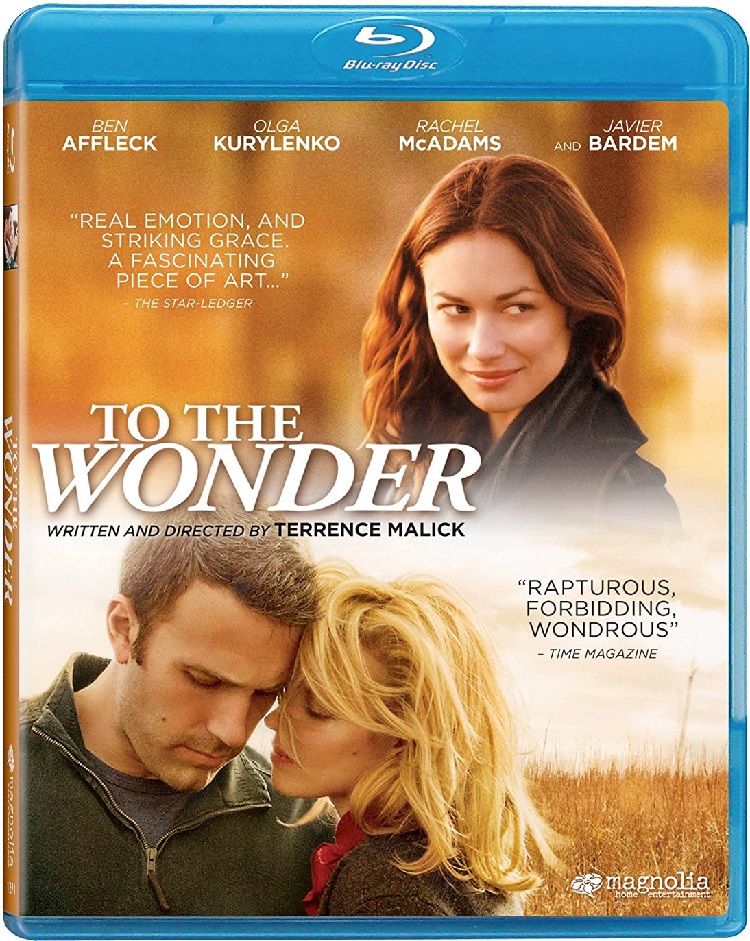
The Film
Terrence Malick’s second film in three years hasn’t been met with quite as much enthusiasm as its predecessor, The Tree of Life, and I fear we’re getting spoiled by this current bout of prolificacy from the filmmaker, who once let two decades pass before making another film.
To the Wonder is in a number of ways stylistically similar to The Tree of Life, employing intuitive editing that’s even less bound by narrative structure and amping up the roving, twirling camera so that there’s barely a static shot in the whole film. Malick’s casual naysayers will find plenty of his pet formal techniques to groan about — mumbled, dissociative voiceover, unmoored shots of nature and a disregard for conventional notions of “acting.”
But, despite the dismissals, this is hardly the same old bag of tricks rehashed or a filmmaker devolving into self-parody; Malick is continuing to radically play with form and his thematic concerns are sharply shifted earthbound here. Malick has always been preoccupied with cosmic questions of meaning — let’s not forget The Tree of Life dealt with no less than the creation of the universe and what lies beyond — but these questions have never been so grounded as in To the Wonder. How does one reconcile the intermittent grandeur of life with the much more common banality and outright hardship? How does one find God in such a place as Earth?
The film’s central relationship between Olga Kurylenko’s Marina and Ben Affleck’s Neil begins in a romantic whirlwind in Paris, with a visit to the glorious island monastery Mont Saint-Michel providing the titular “wonder.” Soon, she, along with her 10-year-old daughter, returns home with him to small-town Bartlesville, Oklahoma. Here, the reality of life’s difficulty seems more present, from the town’s pervasive poverty to the distance that grows between Marina and Neil, emphasized by the empty spaces that separate them in his cavernous, barely furnished house.
And yet, there is beauty here too. Malick isn’t setting up a dismissive dichotomy between the beauty and romance of Paris and the less-attractive middle-of-nowhere Oklahoma. When Marina’s daughter gapes in wonder at the cleanliness and bounty of the local supermarket, Malick isn’t being ironic, and his magic-hour shots of Sonic drive-ins and cookie-cutter suburban neighborhoods are similarly straightforward. These things can be wondrous too, and shot by the incredible Emmanuel Lubezki, they certainly are.
Paralleling the disintegration between Neil and Marina is a relational difficulty of another kind — Javier Bardem’s Father Quintana is trying to come to terms with a God he doesn’t see reflected in his community. Some of the film’s most striking scenes feature Bardem and local non-actors, where he’s desperate to provide a spiritual comfort he doesn’t feel. That particularly harrowing feeling of emotional disquiet is also present in Neil’s fling with Rachel McAdams’ Jane, where the thrill of a romantic connection can only go so far in papering over the hurts of the past.
To the Wonder is beautifully devastating, its lyrical, balletic camerawork sometimes belying just how tough-minded of a film this is. Pain, loss and regret are an essential part of the human experience, Malick seems to be saying, but perhaps they’re also essential to its wonder.
The Blu-ray Disc
To the Wonder is presented in 1080p high definition and a 2.35:1 aspect ratio. Magnolia’s Blu-ray, despite boasting almost the least representative cover art possible, is a thing of beauty inside, with an exceptionally sharp, detailed transfer. Clarity is superb and digital over-manipulation is nowhere to be seen. The 5.1 DTS-HD Master Audio track is similarly excellent. The film opens with a note that the producers recommend you play the disc loudly, and it’s good advice — the intricate sound design is replicated very nicely, featuring crystal clear, immersive use of the surrounds and frequent rumbling from the subwoofer.
Special Features
There’s nothing essential here, and of course, the reclusive Malick is nowhere to be seen, but the 10-minute making-of featurette has a couple good sound bites from the principals and the producers. Three other shorter featurettes on the actors’ experience, Malick’s unusual shooting style and the use of non-actors are also included, but frustratingly, they all reproduce interview segments from the longer making-of, turning the supplements into an unnecessarily repetitive experience. The film’s theatrical trailer rounds out the disc.
The Bottom Line
It seems destined to be overlooked, but To the Wonder is another Malick masterwork.